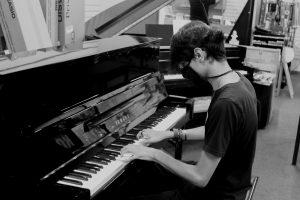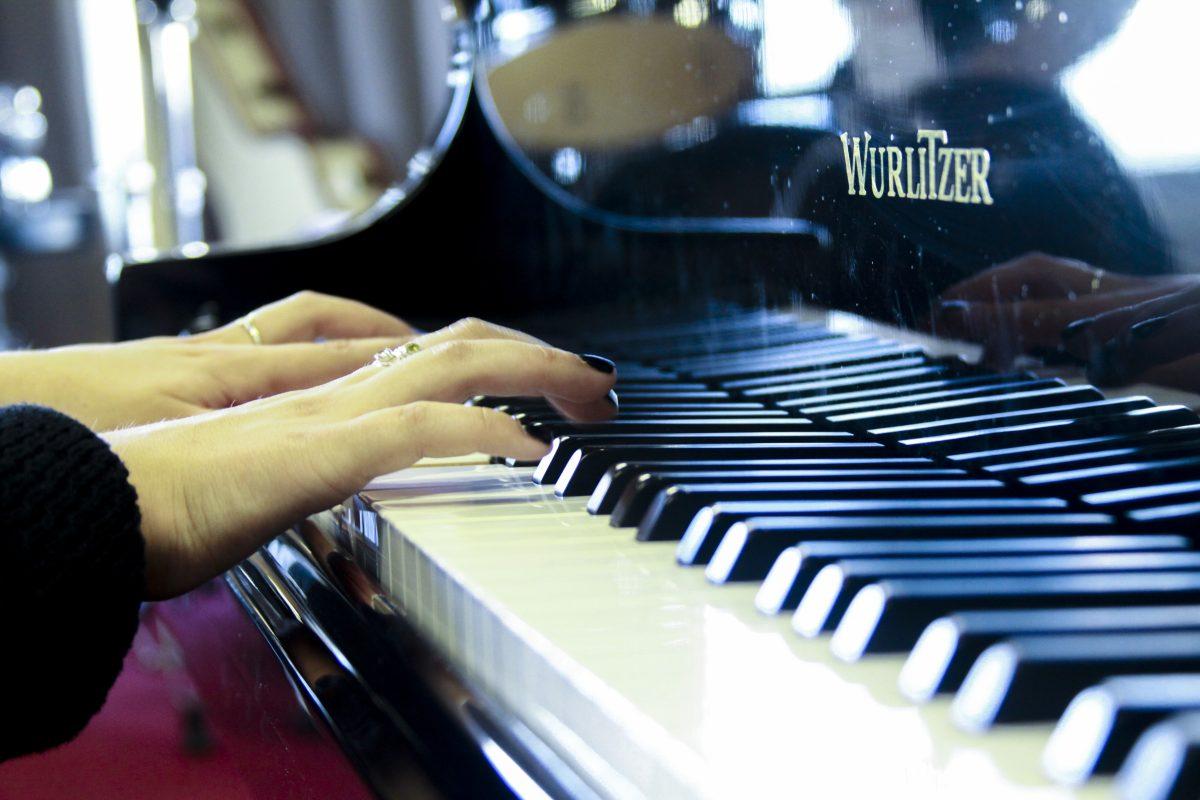Why taking up a new instrument this fall is not only fun but good for your health.
Kate Couch/ The Broadside
As the days get shorter, the air gets colder and the trees lose their leaves, the days of going outside and enjoying the sun are coming to an end. On top of all of that, we have been cooped up inside not being able to do normal fall activities because of COVID. All this makes boredom a close friend. But it’s time to shake the blues with a new activity — music! There are many psychological and physical health benefits to taking up a new instrument and it’s easier to get started then you think.
When asked why is it beneficial mentally for a person to take up a new instrument even if they already know one it’s the act of taking up a new one), Riki Dela Cruz, Professor of Psychology and Human Development at COCC said this,
“Learning a new musical instrument has the potential to have both lasting and positive psychological effects on the brain. Students or individuals who choose to learn a new instrument are actively exercising their brains and minimizing the effects of stress, depression, and anxiety. At the same time, learning a new instrument can do wonders for one’s mindfulness, especially during times of chaos.”
Playing instruments is not the only thing beneficial but listening to music as well. Music and the brain are a widely studied topic. A study done about a music program designed for war veterans found that listening to music facilitates positive communication skills, improved emotional release, and was found to have decreased anxiety and agitation. Music therapy is new, but new research and trials have found music has the properties to heal.
Lots of people will say playing an instrument makes you smarter, but is there truth to that claim?
Prof. Dela Cruz discussed how Harvard neurologist Gottfried Schlaug in his studies discovered that adult professional musicians’ brains had a larger volume of gray matter than the brains of non-musicians. She also explained that,
“Schlaug and colleagues found that after 15 months of musical training in early childhood, structural brain changes associated with motor and auditory improvements begin to appear.”
If you want to pick the one that will make you “smartest” you might consider learning how to read music and play the piano. In a study done on the topic, researchers found that learning to read music and play the piano could enhance your mood. This study also found that playing an instrument can slow certain aspects of the aging process both down on the body and the brain.
Okay, You Sold Me Now Where Do I Start?
Sunday Guitars is a local business located in Bend that has a beautiful store with lots of Instruments and accessories if you decided that you want to take up an instrument their store is a great local option.
There are a lot of different instruments and it can be hard to know what one is right for you. Manager Kirk Gruending, at Sunday Guitars, answered questions about picking up a new instrument and weighed in some good choices.
When asked what is the best instrument for a college student? Gruending said, “A traveler instrument for sure. When you are in a small space and on the go, the traveler is there for you. A well-made one will have good sound and if they are small enough, you can take them camping, traveling, or in between classes. If you want a better sound and can spend some extra cash ones with an arched back which have more bass and a more whole round sound.’’
Traveler instrument options include: The ukulele (Gruending chuckles as he explains, “though a college student stereotype it is reliable, cheap, and easy to learn”), the guitar, a Cajon (a small drum which could also double as your desk chair!), the clarinet and small percussion instruments i.e. maracas, egg shakers, tambourine, bongos
Classical More Your Style?

If you want to take the classical route you could pick up the clarinet, the flute, or even the trumpet for a cheaper option. If you have a bit more to spend and some dedication you could try the piano, (you can pick up a keyboard for under $200), the violin, or the alto saxophone. These instruments are harder to learn and more expensive but are often more rewarding.
Want to be in a band?

When asked the choice between bass guitar or guitar, Gruending had a mixed answer,
“Well… that’s depending on what you want to do with it, for the singer-songwriter complex you’ll want to choose a guitar, there are a million teachers and more options. It will give you the freedom to sing and create. But if you want to rock out in-band or even have a better chance of getting into one you’ll want to choose bass- it’s harder to master but it’s a rewarding instrument that holds the whole band together and good bass players are hard to find.” Learning contemporary piano (think Adele) or taking singing lessons could also land you a spot in a local jam band.
Gruending ended with saying,
“Overall pick something that you’ll look at and smile- choose something that excites you and you’ll have a blast learning something new.”
Picking up an instrument is a great way to discover something new about yourself, be creative, lower stress, try something new, and challenge yourself this fall.
These are photos of some instrument options at Sunday Guitars.

Ibanez Acoustic 1005 $199.99

Sound Smith Ukulele $59.99

4/4 Stentor II $249.99

Casiotone Piano Keyboard $189.99

Jupiter Trumpet $249.99

Johnson Harmonica $8

Baltimore Bass $229.99
And Many Many More.. check out Sunday Guitars store for more options.
If you are looking for a music teacher in the area, here are a few recommendations:
String Theory Music– Guitar, ukulele, banjo, mandolin, bass, violin/fiddle, piano, voice and group performance
Melody Music Studios (800-635-6391)- Piano, Voice, Guitar
La Di Da Lessons– ukulele and guitar
Piano Lessons by Jeannie Olson (541-504-0772)








